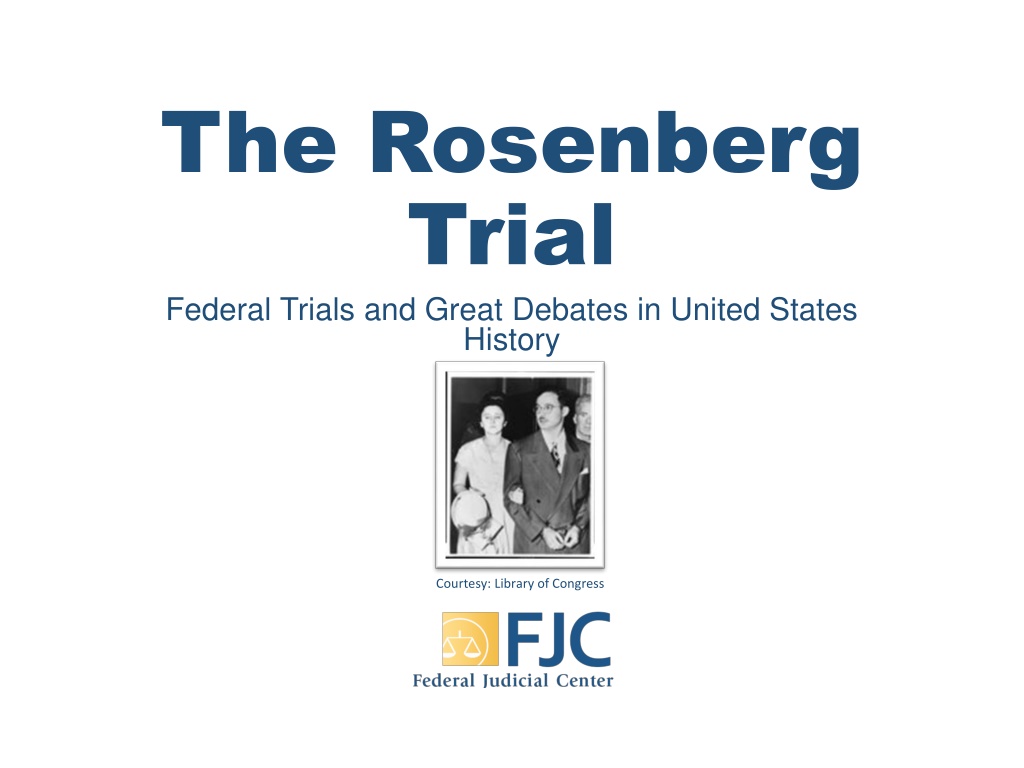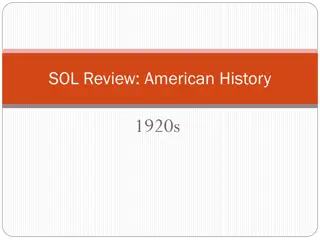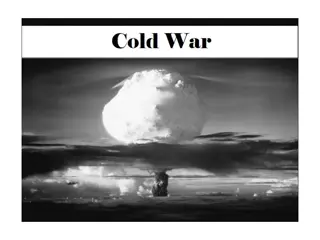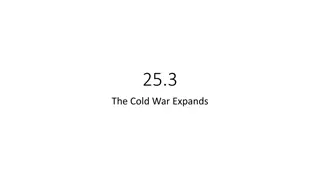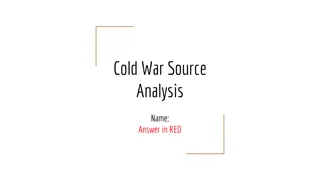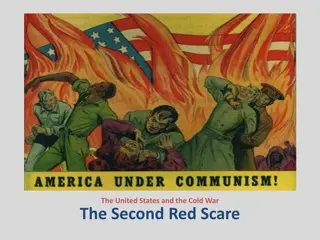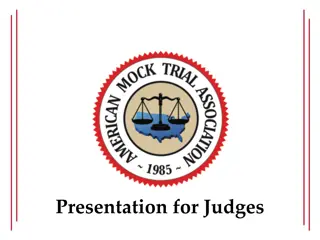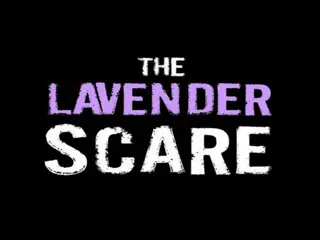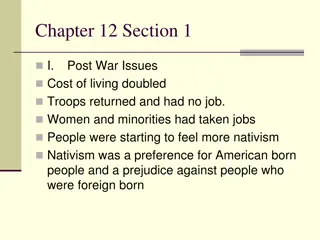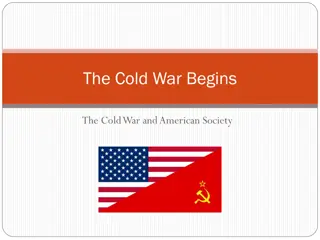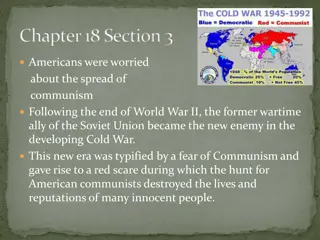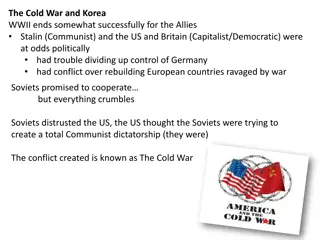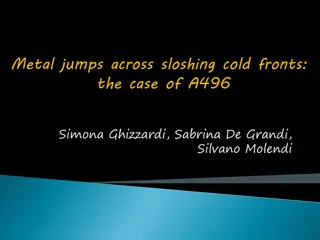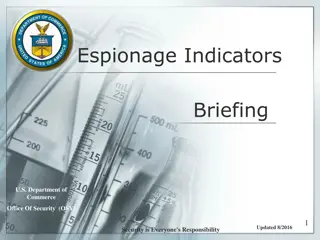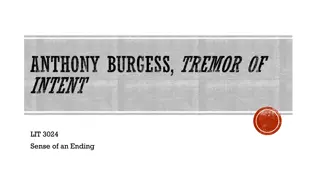The Rosenberg Trial and the Red Scare: Cold War Espionage and Anti-Communist Hysteria
The Rosenberg Trial during the Cold War era exemplified the heightened tensions of the time, showcasing accusations of espionage, Communist subversion, and anti-American sentiment. Julius and Ethel Rosenberg faced allegations of passing atomic secrets to the Soviet Union, amid a backdrop of fear and suspicion that characterized the Red Scare era in the United States.
Download Presentation

Please find below an Image/Link to download the presentation.
The content on the website is provided AS IS for your information and personal use only. It may not be sold, licensed, or shared on other websites without obtaining consent from the author. Download presentation by click this link. If you encounter any issues during the download, it is possible that the publisher has removed the file from their server.
E N D
Presentation Transcript
The Rosenberg Trial Federal Trials and Great Debates in United States History Courtesy: Library of Congress
The Red Scare The end of World War II left the United States and the Soviet Union as the two most powerful nations in the world. Americans feared that the Soviet Union wanted to destroy the United States and become the world s dominant power. The U.S.S.R. s attempts to expand its sphere of influence in Europe and its acquisition of the atomic bomb in 1949 heightened these fears. 2
The Red Scare During the Cold War (1950s-1980s), Americans feared Communist subversion to weaken the U.S. on behalf of the Soviet Union. Many Americans believed that Communists were conducting espionage, stealing American military and intelligence secrets to give to the U.S.S.R. 3
The Red Scare Communist Party USA leaders were prosecuted for advocating the overthrow of the government. Former State Department official Alger Hiss was accused of being a Communist spy and convicted of perjury. Senator Joseph McCarthy conducted a campaign against the alleged Communist infiltration of government. The House Un-American Activities Committee investigated allegations against supposed Communists. Senator Joseph McCarthy Library of Congress 4
The Chain of Arrests Klaus Fuchs: A German scientist who had worked at Los Alamos, Fuchs was accused of giving the Soviets information on the atomic bomb. Harry Gold: The arrest of Fuchs led to the arrest of Gold, who served as a courier between Fuchs and the Soviets. David Greenglass: Gold s description of a man who gave him classified information from Los Alamos in 1945 led to the arrest of Greenglass. Julius Rosenberg: Greenglass implicated his brother-in-law Julius as having brought him into the espionage conspiracy. Ethel Rosenberg: Despite having little evidence against her, the FBI arrested Julius wife Ethel in order to pressure Julius into naming other members of the conspiracy. Morton Sobell: Sobell was a friend of Julius who was arrested later and accused of being part of the espionage conspiracy. 5
The Allegations at Trial The Rosenbergs were avid Communists who admired the Soviet Union. When David Greenglass went to work at Los Alamos after WWII, the Rosenbergs asked his wife, Ruth, to convince him to steal information on the atomic bomb. Greenglass gave the Rosenbergs the stolen information and Ethel typed up his notes to give to the Soviets. Julius sent Harry Gold to Los Alamos as a courier with half of a torn Jell-O box; Ruth and David had the matching half so that they and Gold could identify each other. Courtesy: National Archives 6
Judge Irving Kaufman Kaufman served as a federal prosecutor before his judicial career. The judge was known as a staunch anti- Communist. The defendants claimed that Kaufman was biased and unfair during the trial. Kaufman called the Rosenbergs crimes treason and worse than murder after their conviction. The judge consulted privately with the prosecution and Justice Department officials before passing sentence. Judge Irving Kaufman Courtesy: Library of Congress 7
Convictions & Sentences David Greenglass: Pleaded guilty to conspiracy to commit espionage; sentenced to 15 years in prison. Morton Sobell: Convicted of conspiracy to commit espionage; sentenced to 30 years in prison. Julius and Ethel Rosenberg: Convicted of conspiracy to commit espionage; sentenced to death. Julius and Ethel Rosenberg Courtesy: Library of Congress 8
Appeals The Rosenbergs appealed their conviction to the U.S. Court of Appeals for the Second Circuit and the Supreme Court, with no success. They also requested a rehearing and a reduced sentence from the U.S. District Court; these attempts failed as well. Supreme Court Justice William Douglas granted a stay of execution, but the full Supreme Court quickly lifted the stay. President Eisenhower twice denied the Rosenbergs requests for executive clemency. Justice William O. Douglas Courtesy: Library of Congress 9
Issues on Appeal Did the Justice Department knowingly use perjured testimony from David Greenglass? Was it fair to allow the jury to hear that the Rosenbergs belonged to the Communist Party? Was Judge Kaufman fair to the Rosenbergs during the trial? Did publicity before and during the trial prejudice the jurors against the Rosenbergs? 10
Issues on Appeal Did the prosecutor act unfairly by publicly announcing the arrest of a Rosenberg and Sobell associate during the trial? Did the death penalty for the Rosenbergs constitute cruel and unusual punishment? Should the Rosenbergs have been sentenced under a different statute that would have required a jury recommendation for a death sentence? 11
Reaction The National Committee to Secure Justice in the Rosenberg Case formed after the National Guardian, a left-wing newspaper, began a campaign to exonerate the Rosenbergs. There were public protests against the executions in France, England, and Italy. Soviet satellite states exploited the executions for anti- U.S. propaganda purposes. Many Rosenberg supporters, especially outside the U.S., alleged that anti-Semitism was a factor in the case. The U.S. press remained on the side of the government; the Chicago Daily News was the only major U.S. paper to advocate for clemency. 12
Execution and Aftermath The Rosenbergs were executed in the electric chair at Sing Sing prison on June 19, 1953. In 1990s, documents released from Soviet archives and intercepted cables released by the U.S. confirmed that Julius Rosenberg did spy for the Soviets. The documents and cables also revealed that Ethel knew about Julius spying but probably did not spy herself. The material about the atomic bomb that Julius gave to the Soviets was likely of little value. 13
Execution and Aftermath David Greenglass was released from prison in 1960 and lived under an assumed name. In 2001, Greenglass admitted that he had committed perjury with regard to Ethel s role in the conspiracy in order to save his wife Ruth from prosecution. Morton Sobell was released from prison in 1969; in 2008 he admitted he had been a Soviet spy. The case remains controversial and has often been referenced in popular culture. 14
